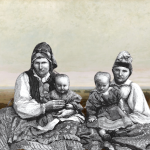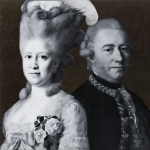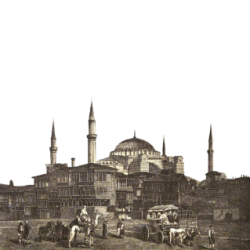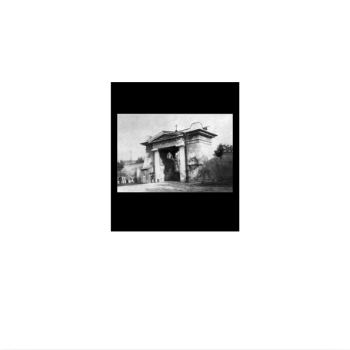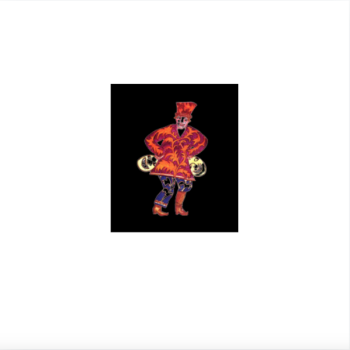THE MYSTERY OF GENERAL INZOV
The summer of 1817 was spent, for the most part, traveling around the colonies of Kherson Province and getting acquainted with their general condition. Elena Pavlovna and her grandmother were insisting that Andrei Mikhailovich go to Kharkov, and sit for the university examination so that he might reach the next rank. This was so he could break away from the host of titular advisers. Andrei Mikhailovich was reluctant, having already acquired decades of experience, it seemed absurd to join the ranks of “schoolchildren.” At the end of 1817, the ministry found it necessary to send Andrei Mikhailovich to St. Petersburg, with financial reports concerning the allocation of funds for immigrant colonists.
He left at the beginning of 1818, traveling in bad weather along roads impassable with mud. Circumstances required him to make frequent stops. For one thing, there was a lack of horses; then there was the brewing strife among the Hutterites of the Radichevo Colony. A splinter group wished to abandon the principle of community of goods. Johannes Waldner, however, insisted on preserving that time-honored principle. “I would rather die at the stake,” said Waldner, “than abandon the old practice.” The eventual result was a split in the movement, and Waldner, heading a new colony called Neudorf. [1]
Andrei Mikhailovich eventually arrived in St. Petersburg, where he stayed with his brother Pavel, who was then serving under Count Alexey Andreevich Arakcheev. Immediately upon his arrival, Pavel’s three-year-old son fell ill with a severe cough which turned out to be the croup. The boy died a few hours later. They barely had enough time to take him to the cemetery when, upon returning home, the eldest son, a six-year-old boy, walked in with the same symptoms. They sent for the best doctor, but it was to no avail. He suffered the same fate as his brother. Andrei Mikhailovich had the double responsibility of consoling his brother, and burying the boy, for Pavel was in no condition to do so.
When Andrei Mikhailovich was finally able to meet with the government officials, they showed him the most gracious disposition in everything and received him very kindly. This trip brought Andrei Mikhailovich closer to Osip Petrovich Kozodavlev who was made General Directorate of Religious Affairs of Foreign Faiths in 1817. He also had the opportunity to meet with Stepan Semenovich Dzhunkovsky, a respectable and intelligent man who was the Director of the Department for Colonization. While he was in St. Petersburg, a new transformation took place in the administration of the colonies in Novorossiysk and Bessarabia. The reason for this was a petition to Alexander Pavlovich from Madame Krüdener for permission to resettle in Russia. When Jung-Stilling died in 1817, his followers wanted to migrate to Russia to flee the chaos of war and await the Second Coming of Christ. They would settle near the pre-existing German Mennonite colonies by the Volga and the Black Sea.[2] To manage these settlement grants, a trustee committee was established headed by General Ivan Nikitich Inzov. Three offices (Ekaterinoslav, Odessa, and Bessarabia) were created for local administration. An institution of this kind could have been useful if many thousands of Germans had actually poured into Russia from Germany, but this did not happen. The German Government prevented the resettlement of the masses. The spread of Pietism on a large scale did not occur, and in general, in the following years, the people from those countries who decided to leave their homeland preferred moving to America over moving to Russia. General Inzov’s focus, therefore, was primarily drawn to the Bulgarian settlers.
With this new institution, Andrei Mikhailovich received the position of Chairman of the Ekaterinoslav Office of Foreign Settlers and a salary of three thousand rubles (greatly improving his material condition.) He returned from St. Petersburg in June, followed shortly thereafter by his new boss, General Inzov. The personality of General Inzov was very mysterious due to his origin, which no one seemed to know. His service record stated he was “from nobility,” but few, if any, persons alive knew this family, nor had they ever been closely acquainted with Inzov during his earliest years.
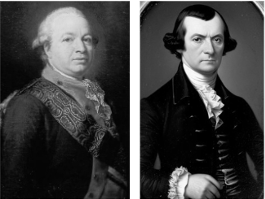
(Left) Count Yakov Aleksandrovich Bruce.
(Right) Prince Yuri Nikitich Trubetskoy.
Princess Paraskeva Yureevna Kologrivova, the daughter of Prince Yuri Nikitich Trubetskoy, told Andrei Mikhailovich what she knew of the early life of Inzov. One day, many years ago, her father’s friend, Count Yakov Aleksandrovich Bruce, arrived at their family home Penza. He was on a mission from St. Petersburg to deliver a young boy. To the surprise of Prince Trubetskoy, Count Bruce urgently requested that the prince take the boy in and care for him as if he were his child and give him the best upbringing and education possible. Count Bruce assured Prince Trubetskoy that all the necessary expenses would be covered and that further details would be forthcoming.
“What kind of boy is this?” Prince Trubetskoy asked. “Who is he?”
“This shall remain a secret, which cannot be answered now,” said Count Bruce. “I can only say that it will be answered before his death, and to him alone.”
“At least tell me his name,” said Prince Trubetskoy. “What is his last name?”
“His name is Ivan,” Count Bruce replied. “His last name is Inzov.”
No other information was given. Count Bruce returned to St. Petersburg, and young Inzov remained in the care of the Trubetskoy family. Naturally, this created many opportunities for conjectures of all kinds and forced one to assume the probable intentions of obscuring his real name and origin. There were rumors that he was the son of a very high-ranking official. Since General Inzov bore a striking resemblance to Grand Duke Constantine Pavlovich, some concluded that he was the illegitimate son of the late Tsar.
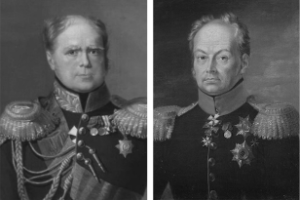
(Left) General Ivan Nikitich Inzov.
(Right) Grand Duke Constantine Pavlovich Romanov.
The boy lived in the Trubetskoy house as if in his own family, given love, affection, and education. Count Bruce continued to send money as promised until his untimely death from apoplexy at the end of 1791. The Trubetskoy family soon found themselves in a difficult situation, as they now had to provide for Inzov with their own money. It was difficult, but they continued to support the boy through his adolescence, providing him with a good upbringing. When he turned seventeen, and eligible for military service, Prince Trubetskoy took Inzov to St. Petersburg, where he told Catherine the Great what he knew of the boy’s history. Inzov was immediately enlisted into guard service. He was appointed directly as adjutant to Prince Nikolai Vasilyevich Repnin (Governor General of Livonia and Estonia,) who immediately gave him the rank of First Major and given three thousand chervonets for uniforms and supplies.[3] Things seemed to work out well for Inzov in the subsequent chapters of his life, getting married and serving in important military campaigns. All the while, Inzov’s service was closely followed by Catherine the Great, and her successors, Tsars Pavel Petrovich and Alexander Pavlovich, until his appointment to govern the colonies (already in the rank of Lieutenant General.)
If Inzov did not have a brilliant, prominent career, it was solely because he did not want it. He lacked the ambition and pretension to any military and civil valor. Though he served in the military, there was nothing in his nature that could be mistaken for militant. He was a kind man, knowledgeable, completely selfless, and particularly pious. In terms of morality, he was impeccable. When there was no special official work, he was known to help the clerks sew up papers in their cases. At the same time, however, he was weak, indecisive, and often subject to the influence of people unworthy of it.[4]
If Inzov did not have a brilliant, prominent career, it was solely because he did not want it. He lacked the ambition and pretension to any military and civil valor. Though he served in the military, there was nothing in his nature that could be mistaken for militant. He was a kind man, knowledgeable, completely selfless, and particularly pious. In terms of morality, he was impeccable. When there was no special official work, he was known to help the clerks sew up papers in their cases. At the same time, however, he was weak, indecisive, and often subject to the influence of people unworthy of it.
There is another bit of intrigue, somewhat parallel to this story, which involved Lord George Gordon Byron, the rebellious English poet (who Russian authorities tried to censor.) Though his writings would not officially appear in Russia until 1818, his works nevertheless trickled through.[5] (John Quincy Adams was reading Byron’s Childe Harold during Napoleon’s invasion of Moscow.)[6] In the summer of 1816 Lord Byron rented a mansion, Villa Diodati, near Lake Geneva in Switzerland, and stayed there with his physicians, Dr. John Polidori. Byron’s friends, Romantics poets like himself, rented a house nearby. Mary Shelley, her husband Percy Bysshe Shelley, and Mary’s stepsister Claire Clairmont, made frequent calls on Byron. There was much bad weather in June 1816, so the aforementioned group spent three days together inside the mansion, crafting horror stories to tell one another. Two of the stories told that night would become seminal works of Gothic Literature. Polidori would publish the first modern vampire story, The Vampyre, in 1818. The manuscript for this work in 1817, however, was in the villa of his friend, Ekaterina Bruce, the daughter Count Yakov Aleksandrovich Bruce.[7] (A Russian version was published in Moscow in 1828.)[8] As for the other work, that too would be published (anonymously) in 1818, Mary Shelley’s Frankenstein. Shelley was the daughter of the social philosopher, Mary Wollstonecraft, who was, perhaps, the first Feminist writer in the English language.[9] Themes of that nature are abound in the work (especially the Enlightenment philosophies of Kant, Rosseau, Hegel, etc.)[10] It was a morality parable on humanity’s hubris, and the potential horrors of the Industrial Revolution and the Enlightenment.[11] It was nature versus science; superstition versus reason; Creator versus creation. It was many things, not least of which a metaphysical reflection of the temporal map of the world. The “Creature” in Frankenstein was created in Rosseau’s Geneva, after all. In the story Doctor Frankenstein places the brain of his deceased mentor, Doctor Waldman, inside the body of the man who killed him and various other corpses.[12] One might see in the cartography of this growing empire both Frankenstein and the Creature. Enlightenment thought conflicting with tradition, industry without foresight, and parts of various nations stitched together to form a “Creature” over which to govern.
-
- NOVOROSSIYA
- The Arbiter Of Europe’s Destiny.
- The House Dolgorukuy
- Madame Krüdener
- Ekaterinoslav
- The Arabat Arrow
- The Mystery Of General Inzov
- The Doukhobors
- Pushkin
- Chuguev Military Settlement
- “The Blessed”
- The Decembrists
- Penza
- Independence
- Last Words Of Samuel Khristianovich Kontenius
- “Amid Coffins And Desolation”
- Rusalka
- Dead Souls
- Secret Passages
- Astrakhan
- Nevsky Prospekt
- Kalmyk Ulus
- Love And Ambition
- Duellistes
- Pyatigorsk
- A Heroine Of Our Time
- Winter Palace
- Zeneida R-Va
- Steppes
- Letter To Natalya
- Fire And Ice
SOURCES:
[1] (eds.) Bender, Harold S; Smith, C. Henry. The Mennonite Encyclopedia: Vol. IV O-Z. Mennonite Publishing House. Scottsdale, Pennsylvania. (1959): 877.
[2] Pesenson, Michael A. “Napoleon Bonaparte And Apocalyptic Discourse In Early Nineteenth-Century Russia.” The Russian Review. Vol. LXV, No. 3 (July 2006): 373-392.
[3] [Chervonets was the Russian term for large gold coins]
[4] Fadeyev, Andrei Mikhailovich. Vospominaniia: 1790-1867. Vysochaishe Utverzhd. Yuzhno-Russkago. Odessa, Ukraine. [Russian Empire.] (1897): Part I: 58-63.
[5] Greenleaf, Monika. “Pushkin’s Byronic Apprenticeship: A Problem In Cultural Syncretism.” The Russian Review. Vol. LIII, No. 3 (July 1994): 382–398; Lansdown, Richard; Reichardt, Dosia. “‘Almost As Far As Petersburg’: Byron And The Russians.” Keats-Shelley Journal. Vol. LVI (2007): 52-77.
[6] “I read there Scott’s Vision of Don Roderick; and saw Childe Harolde’s pilgrimage, by Lord Byron, a new Poet.” [“John Quincy Adams Diary Entry: September 2, 1812.” John Quincy Adams Digital Diary. Primary Source Cooperative At The Massachusetts Historical Society.
[7] Viets, Henry R. “The London Editions of Polidori’s ‘The Vampyre.’” The Papers Of The Bibliographical Society Of America. Vol. LXIII, No. 2 (Second Quarter 1969): 83-103.
[8] Kireevsky, Petr Vasilyevich. Vampir: Povest’, Rasskazannaia Lordom Baironom: S Prilozheniem Otryvka Iz Odnogo Neokonchennogo Sochineniia Bairona. Moscow. (1828): Preface.
[9] Ferguson, Susan. “The Radical Ideas Of Mary Wollstonecraft.” Canadian Journal Of Political Science / Revue Canadienne de Science Politique. Vol. XXXII, No. 3 (September 1999): 427-450.
[10] Reese, Diana. “A Troubled Legacy: Mary Shelley’s Frankenstein And The Inheritance Of Human Rights.” Representations. Vol. XCVI, No. 1 (Fall 2006): 48–72; Rajan, Tilottama. “The Work Of The Negative: Symbolic, Gothic, And Romantic In Shelley And Hegel.” Studies In Romanticism. Vol. LII, No. 1 (Spring 2013): 3-32.
[11] Phillips, Bill. “Frankenstein And Mary Shelley’s ‘Wet Ungenial Summer.’” Atlantis. Vol. XXVIII, No. 2 (2006): 59–68.
[12] “In my education my father had taken the greatest precautions that my mind should be impressed with no supernatural horrors. I do not ever remember to have trembled at a tale of superstition or to have feared the apparition of a spirit. Darkness had no effect upon my fancy; and a churchyard was to me merely the receptacle of bodies deprived of life, which from being the seat of beauty and strength, had become food for the worm. Now I was led to examine the cause and progress of this decay and forced to spend days and nights in vaults and charnel houses.” My attention was fixed upon every object the most insupportable to the delicacy of the human feelings. I saw how the fine form of man was degraded and wasted; I beheld the corruption of death succeed to the blooming cheek of life; I saw how the worm inherited the wonders of the eye and brain. I paused, examining and analysing all the minutia of causation, as exemplified in the change from life to death, and death to life, until from the midst of this darkness a sudden light broke in upon me—a light so brilliant and wondrous, yet so simple, that while I became dizzy with the immensity of the prospect which it illustrated, I was surprised, that among so many men of genius who had directed their enquiries towards the same science, that I alone should be reserved to discover so astonishing a secret.” [Shelley, Mary Wollstonecraft. Frankenstein; Or, The Modern Prometheus. Thomas Hodgson. London, England. (1846): 38.]


